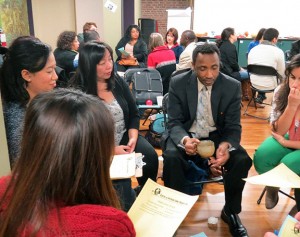The motto for Center for Intercultural Organizing (CIO)—a Pride Foundation grantee in Portland, Oregon—is to “build, organize, and activate.”
In the words of Zack Mohamed, CIO’s LGBTQ Equity and Inclusion Coordinator, the organization “…supports members from the immigrant and refugee community by giving them the tools and necessary training to organize their community.”
This includes teaching leaders how to bring a diverse group of people together around solutions, and building people’s skills to be vocal about the needs and wishes of their community.
Founded by Portland-area immigrants and refugees post- 9/11, CIO’s initial focus was on combatting the increasingly widespread anti-Muslim sentiment. In the years since, CIO has expanded their programming to holistically support the needs of immigrant and refugee families.
Through education, civic engagement and policy advocacy, community organizing and mobilization, and intergenerational leadership development, CIO is on the front lines of community-based efforts to protect and expand immigrant and refugee rights.
In 2013, the organization developed an LGBTQ program within their advocacy and leadership work, allowing them to focus on the unique set of issues faced by LGBTQ immigrants and refugees. For example, some were closeted due to fear of familial or cultural isolation and needed additional support around this aspect of their experience.
LGBTQ immigrants are also at a heightened risk for physical and sexual abuse while in immigration detention. It is still relatively rare for LGBTQ immigrants to obtain asylum or refugee status—and many have a very real fear of persecution or death if they get sent back to their country of origin.
In order to enhance their organizational infrastructure to address these needs, CIO joined the Uniting Communities Cohort—an 18-month training program developed by Western States Center that convenes a group of organizations working with and for communities of color to support one another in addressing the intersection between race and LGBTQ justice.
Emerging from this work, CIO’s LGBTQ members developed Resilient Connections—a program that creates a space for LGBTQ immigrants and refugees to come together, share their stories, and draw strength and validation from their lived experiences.
Zack Mohamed, who leads the Resilient Connections program at CIO, explains that “the space is designed to build relationships, alleviate the burden of societal and cultural norms, and allow people to relax and fully express themselves—without fear of being made to feel uncomfortable or unsafe on account of gender identity, race, ethnicity, sexual orientation, age, physical or mental ability.”
Zack is a native of Somalia, an active leader in Portland’s African community, and a Muslim and refugee himself. His background gives him a unique understanding of the experiences of many Resilient Connections members.
Through Resilient Connections, members participate in leadership development and create opportunities to advocate for institutional and systemic change on the issues that impact their lives. Members are able to develop a unified voice, advocate for their rights, and create an environment in which they are recognized and supported as valued community members.
Pride Foundation’s grant to CIO is focused on building the organization’s internal capacity to advance the newly established Resilient Connections program. Through this funding, Resilient Connections will also provide opportunities for CIO’s full membership, staff, and board to learn about LGBTQ issues and participate in campaigns and partnerships that will further LGBTQ justice for immigrants, refugees, and people of color.
“This grant will build the groundwork for future LGBTQ work and ensure a supportive organizational structure that emphasizes the needs of CIO’s LGBTQ members,” shared Zack. “This message will reach people who feel the double isolation of being immigrant and refugee and LGBTQ—allowing people to feel safe and welcome to be who they are.”
In a move that signified their commitment to LGBTQ equity work, CIO “came out” as an organization on Coming Out Day and released this powerful statement:
“Despite inspiring wins for marriage equality, LGBTQ people of color continue to fight multiple attacks of racism, sexism, homophobia, and transphobia. These attacks are made worse by the isolation and invisibility that can surround LGBTQ people of color in their families, communities, organizations, and social justice movements.
It takes organizing and advocacy led by queer and trans people of color (QTPOC) to shift the balance of power and inequality, advance our values of gender justice, and put into place systemic remedies that make meaningful changes in our lives. Like our leaders who’ve come before us, our communities and allies resist, fight and transform.”
Currently, CIO and Resilient Connections are leading a coalition of community partners to pass Oregon’s End Profiling Act, which would enact a statewide system for individuals to be able to report incidences of profiling by law enforcement.
LGBTQ communities and communities of color have long experienced targeting and profiling by law enforcement—with LGBTQ people of color and transgender people at heightened risk for profiling. This legislation would ban profiling on the basis of someone’s race, ethnicity, color, national origin, age, sexual orientation, gender identity, physical or intellectual disability, serious medical condition, income, language, political affiliation, or religion, would require training of law enforcement about profiling, and would create an avenue for people who have been profiled to report their experience.
Pride Foundation is honored to support first-time grantee CIO as the organization deepens their investment in supporting LGBTQ immigrants and people of color. We know that the work of building connections between movements for social justice can be difficult, but that it is critical for our communities.
Katie Carter is Pride Foundation’s Regional Development Organizer in Oregon. Email Katie.
